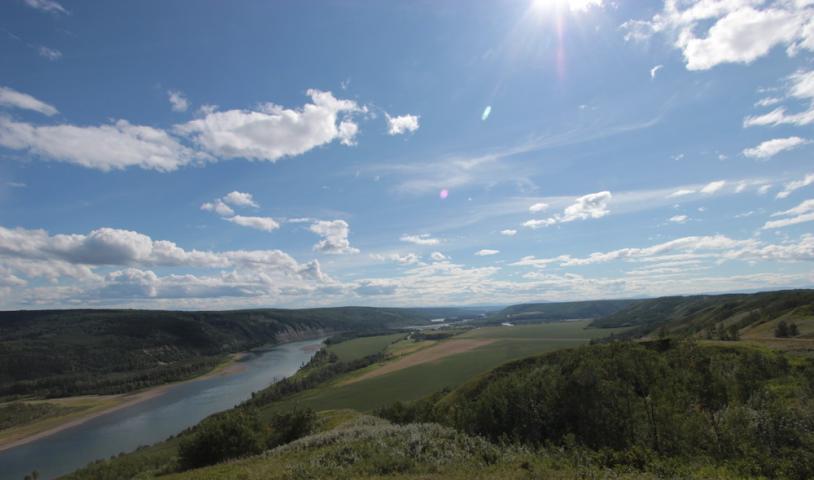Salteau First Nations votes to accept deal on Site C
Monday, July 13, 2015
In a significant milestone for BC Hydro, the Salteau First Nations has voted overwhelmingly in favour of an Impact Benefits Agreement over the Site C dam.
With the vote, Saulteau will not join other Treaty 8 Nations in legal challenges, Chief Nathan Parenteau has confirmed to Alaska Highway News.
The move comes about a week after the McLeod Indian Band backed out of a lawsuit against the dam.
Details of Saulteau's benefits agreement are not being released, but Parenteau has confirmed that it includes both lump sum and annual payments.
Saulteau said it will also be given Crown land to compensate for territory lost to the dam's reservoir.
A water strategy program will be funded by BC Hydro to deal with changes to Moberly River, which will be impacted by the dam.
The 1,041-member nation — the majority of whom live off-reserve — voted through an online referendum held July 6-10. Sixty-two per cent voted in favour of the agreement, 37.8% voted against it and 0.7% abstained.
As part of the deal, the Crown corporation will also fund a moose management plan, create a cultural continuity fund and bring community investments to the reserve.
The deal also calls for a fund to revive Aboriginal culture.
“We’re looking at different ways to use it, and one would be a language program for all three languages that we use here,” Parenteau said. The program would educate “anybody who wants it,” in the Cree, Saulteau and Dunne-Za languages.
Eventually, Parenteau hopes to be able to use the fund to bring classes out onto the land, incorporating hunting trips throughout the Saulteau territory.
“The importance of the land — because we are First Nations people, we are the stewards of the land and we really take that seriously,” said councillor Lana Garbitt.
With the agreement, dollars will flow from BC Hydro to the First Nation council to assist with the development of community investment initiatives and a strategic plan for the use of the money.
The announcement of the "yes" vote was made with a heavy heart for Parenteau. When he spoke to Alaska Highway News, the surprise had not yet worn off.
“I’m hurting,” he said. “It’s hard to eat this. My personal [opinion] — I don’t want the project. I never did. So my reaction is of surprise. I really did think [the vote] was going to go in favour of no and so, I’m a little confused. It’s hard to register this.”
Parenteau added that despite the outcome, he is relieved the vote is over.
Negotiations with BC Hydro for the Impact Benefits Agreement had been ongoing for years.
“It's been a long time coming,” he said. “Now that that part of the process is over, we move on. At least now we have a direction.”
Saulteau First Nations lands management staff will gather information from band members on what Crown lands they would like to have as compensation for the dam. The lands management department will begin working with the province and BC Hydro, they said
“Our people are still coming up with ideas about where they would like [land] or possible satellite reserves,” Parenteau told Alaska Highway News on July 7, before results of the vote were known. “There are all kinds of ideas out there.”
The First Nation estimates the dam will cause a 5% decline in the local moose population, due to the loss of calving areas and migratory routes, which will be flooded by the dam’s reservoir.
A moose management program, fully funded by BC Hydro, will look at ways to recover the population.
“You add all the fragmentation and the loss of migratory routes and calving areas with the increased population of wolves and then you add in a major project and hunting regulations being very loose and open and the ungulated populations in the area are just getting decimated,” Parenteau said.
Part of the agreement will see BC Hydro lobby the provincial government for stricter hunting regulations surrounding ungulates, Parenteau and Garbitt said.
Community meetings on the Impact Benefits Agreement were held over the past year on and off reserve in places like Grande Prairie, Dawson Creek and Vancouver, where members of the nation live.
Those who voted in favour of the agreement did so with reservations, Garbitt noted.
“It’s a difficult decision for all of us," he said after ballots were counted. "Even for the people that maybe are [benefitting] from the work component, they still have mixed [feelings]. It's hard to say yes to the destruction of the land in your backyard.”
Although he is opposed to the project, Parenteau said he did not let his opinions about the dam impact the vote during the meetings.
“It was a presentation where I just had to lay out, here are the benefits and here are the impacts if the dam goes through. We tried very hard not to let our own opinions influence the vote.
“We’ve been presented with a benefits package to compensate for our loss of land. That has [been] decided on by the people,” Parenteau said.
Legal challenges from Saulteau's neighbours — West Moberly and other Treaty 8 nations — are still before provincial and federal courts.
When reached by phone July 12, a spokesperson for BC Hydro would not comment.





